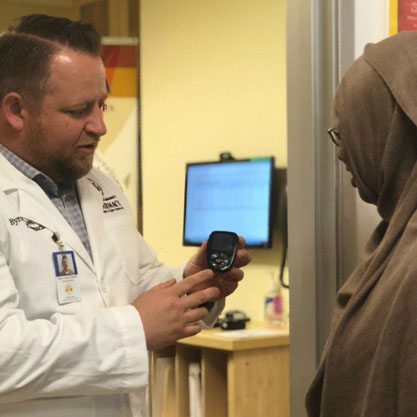Associated Press
LOS ANGELES–(BUSINESS WIRE)–May 14, 2018–La Maestra Community Health Center in San Diego has found a way to get patients with diabetes excited about a needle stick. With the introduction of leading edge, algorithm-based insulin dosing software from Mellitus Health, full access to its patients’ electronic health records and a quick download of blood sugar readings from patients’ glucometers, pharmacists at the clinic can spot patients whose insulin dosing regimens aren’t performing well. They then refer patients to clinicians for a five-minute consultation to adjust their regimens based on precision recommendations from Mellitus Health’s software.
Director of Pharmacy Byron Jones, Pharm.D., discusses the importance of testing blood sugar regularly with a La Maestra patient. (Photo by Jennifer Cao, Pharm.D.)“Diabetes patients often get discouraged because they test their blood sugar all the time and inject their prescribed insulin and still don’t see their blood sugars improve enough. They don’t see the payoff,” explains La Maestra Director of Pharmacy Byron Jones, Pharm.D. “Mellitus Health is changing that by algorithmically recommending insulin and injection-specific dosing for each patient with its Insulin Insights™ software solution. Patients are very interested—excited, actually—to take their insulin because they have a good chance at finally getting their blood sugar where it needs to be.”
La Maestra Community Health Center, a Federally Qualified Health Center, annually delivers care to 48,000 immigrant, refugee, uninsured and underinsured patients in central, east, and south San Diego. From five clinics, it provides an array of medical, dental and social services in 26 languages to residents of the most diverse ZIP Code in the United States. It also runs the pharmacy, which has full access to patients’ medical records. “That tight integration helps not only our diabetic patients, who often need to be taking more insulin or different combinations of short acting and long acting insulins to manage their diabetes effectively, but also our clinic, which sees a small increase in billed encounters for each five-minute dosing consultation, and our pharmacy, which dispenses more insulin and gets much better outcomes for patients,” explains Jones.
Reducing blood sugar in people who have diabetes has important health benefits. A one point drop in HbA1C, a measure of average blood glucose (blood sugar), can reduce risk of microvascular complications such as diabetic retinopathy, neuropathy, impotence and kidney disease by 37%. “We immediately saw Mellitus’ potential to initiate helpful drops in HbA1c and wanted it for our patients. We identified about 150 patients with uncontrolled diabetes—those with HbA1c (average blood glucose) readings of 8.0 or higher—and enrolled them in our initiative,” says Jones. “The Insulin Insights™ software works with all insulins and glucometers and doesn’t require patients to change their behavior, factors important in our decision-making since we work with a wildly diverse population of people who use different glucometers and who have vastly different lifestyles. Because of these points and the fact that the software takes only half an hour to set up, we can see it scaling to our other clinics.”
Mellitus Health’s cloud-based decision support software works with all types of insulins and combinations, all 125 dosing regimens and all glucometers, providing dosing recommendations to clinicians in just seconds. Its work expands upon and automates the manual system used in a yearlong study in which 110 patients saw their HbA1C levels fall from an average of 11% to 7.2% in 12 months through proper titration rather than intensive lifestyle intervention and coaching. Mayer B. Davidson, MD, Chief Medical Officer of Mellitus Health, pioneered the use of algorithmic dosing of insulin. A former president of the American Diabetes Association and former editor of its peer-reviewed journal, Diabetes Care, he authored two algorithmic dosing textbooks widely used in medical education and has trained more than 1800 clinicians in manual algorithmic titration of insulin.
But, he says, even for skilled practitioners, manually calculating dosing is challenging and time-consuming, leaving little time for discussing the broader healthcare needs of patients. “Our software incorporates many small, seemingly esoteric data points, enabling greater tailoring of insulin dosing than was possible by hand,” Davidson says. “We’re excited to see the results from the La Maestra collaboration and the many pilots that are underway or beginning in six countries.”




















